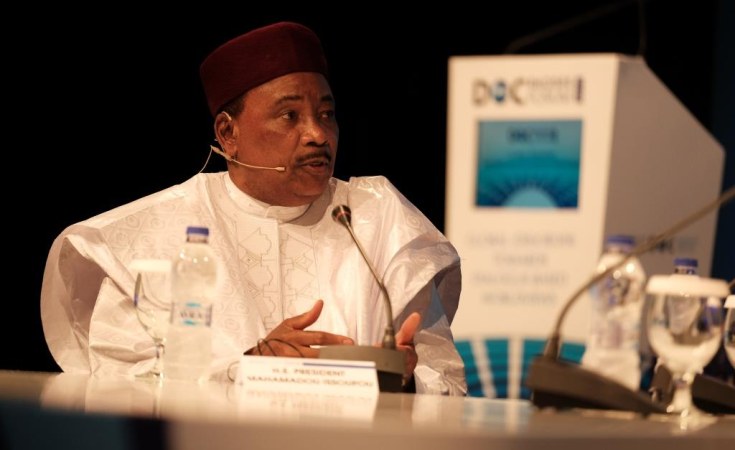Rhodes — The security threat to the Sahel region has been amplified by the Libyan crisis, said the President of Niger Mahamadou Issoufou. In his forthright assessment of the conflict, Issoufou said it seems the world has turned its back on countries that are dealing with the fallout of the crisis.
Issoufou shared an African perspective on issues related to security and economic development at the 17th Rhodes Forum taking place on Rhodes Island in Greece.
"The world has turned its back to what is happening in Libya, as well as other countries battling conflict and instability like Nigeria and Chad. Niger has had to deal with the fallout," he said.
The landlocked Sub-Saharan nation is one of Libya's neighbours and Issoufou said Niger was never consulted whether military intervention was an answer to the crisis there.
"The Intervention in Libya is an example that proves global political governance is not democratic - we had warned the international community against an intervention we knew it will cause trouble," said Issoufou.
And it has caused trouble indeed... Since 2014, Libya has witnessed intense fighting near the capital Tripoli between armed groups, against the UN-backed government led by Fayez al-Serraj. There are no renewed hopes of peace, as rebel commander Khalifa Haftar said he is open to talks with Al-Serraj.
Loss of control
"The terrorists got the power in Libya and this is something we cannot have in a neighbouring country. There is a total loss of control over territory and the International community has not been able to find solutions to the ongoing conflict," Issoufou said.
He said the country cannot even think or consider an election anytime right now given the dire security situation.
"Under an earlier plan, Libya was meant to hold elections in 2018, but that was shelved due to divisions among rival leaders. Bringing back the state must happen first, Africa and the African Union must be involved in this decision and we must have a say - we must work together with the UN, we have experience of what happens in conflict in Africa. Look, we found a solution a for the crisis in Sudan."
Fighting terror groups with little resources
Niger is also dealing with terror threats from Boko Haram and other armed groups. According to the Unicef Niger Humanitarian Situation Report, more than 40 villages in the Maradi region found that refugees and host communities are in urgent need of shelter, household items, food security, nutrition, education, and water, hygiene and sanitation.
In the Diffa region, the report said, the number of displaced people is growing steadily due to attacks by armed groups since March, and there's also been a "general increase in kidnapping cases". Niger is located in the Sahel region which includes parts of Mali, Burkina Faso, Senegal, Algeria, Cameroon, Nigeria, Chad, South Sudan, Eritrea, Ethiopia and Sudan.
Six of the seven countries Niger borders face a security crisis. In the south, along much of the border with Nigeria, Boko Haram and criminal gangs have caused havoc.
"We are fighting against Boko Haram with Chad and Nigeria collaborating," adds Issoufou. Unicef said close to 40 000 refugees have so far fled from atrocities in the Nigerian states of Sokoto, Zamfara and Kastina.
A jihadi insurgency has also impacted on Chad, and the ethnic clashes and insurgencies of northern and central Mali has spilt over into Burkina Faso. Issoufou said the international community is looking elsewhere - not at what is taking place in the Sahel region.
"This is an area we have criminal and terror organisations posing a threat to the region, Africa and to the world."
Issoufou says he would like to see more solidarity and support from the international community.
"The regional block, Ecowas is trying to avoid the cancer of terrorism, what we want is solidarity on an international scale."
UN reform needed
Niger will take up a seat on the UN Security Council in January 2020 and Issoufou believes the Security Council has to reform.
"We will strive to push for reform within UNSC as well as push for political governance and I will express the concerns about what is happening in Niger, the Sahel region and Africa's challenges regarding security."
Stepping down...
Meanwhile, Issoufou told the Rhodes Forum that he was looking forward to handing over the leadership battle to another leader. Issoufou announced that he will step down in April 2021.
"I will be retiring and stepping down and I will not change the Constitution to stay on. We have to promote different power in order for people to express themselves and to elect a new leader."
This will be the first time in the history of Niger that a sitting President will step down. "It is my grandest dream ... like a relay to hand over the baton to a new leader," Issoufou said.
President of Niger H.E. Mahamadou Issoufou was a keynote speaker of this year's Rhodes Forum, the Dialogue of Civilizations Research Institute's flagship global affairs conference


